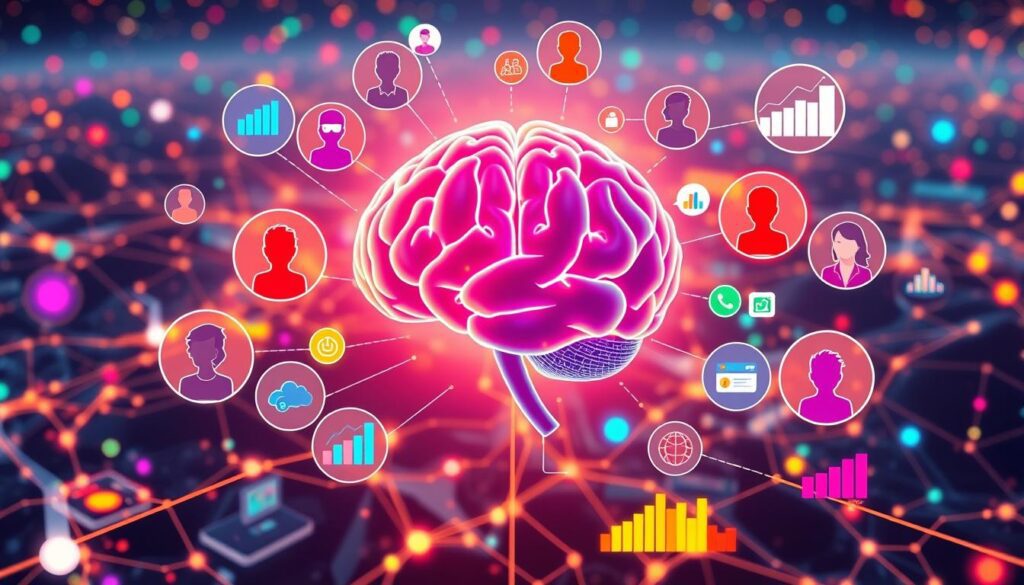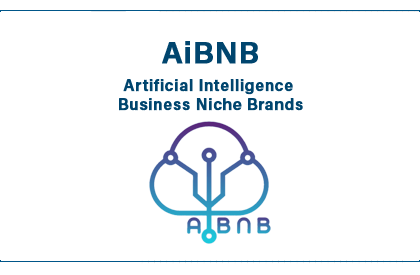I’m thrilled to share how AI is magnifying one of the greatest potential features of the marketing world, precision targeting. AI in marketing allows us to craft campaigns that meet each customer’s unique needs. Customer segmentation is vital, grouping people based on their actions, preferences, and demographics. AI for advertising elevates this, enabling us to deliver experiences that boost engagement and conversion.

In today’s digital realm, hyper-personalized campaigns are essential, not just a luxury. AI in marketing lets us analyze data in real-time, crafting campaigns that connect with our audience. From email to social media, AI enhances our reach. As we explore customer segmentation and hyper-personalized campaigns, we’ll uncover the latest trends and technologies shaping marketing.
Key Takeaways
- AI in marketing enables precision targeting and hyper-personalized campaigns
- Customer segmentation is critical for creating tailored customer experiences
- AI-powered solutions can analyze customer data in real-time
- Hyper-personalized campaigns can drive engagement and conversion
- AI for advertising can help businesses reach their target audience more effectively
- Customer segmentation and hyper-personalized campaigns are essential for businesses to stay competitive in the digital age
The Revolution of Hyper Targeted Marketing with AI
In the realm of marketing, a significant shift towards hyper-targeted campaigns is evident. This transformation is largely fueled by ai-powered tools. These tools allow businesses to dissect customer data, segmenting it with precision. Through machine learning, companies can now craft campaigns that align with specific demographics, behaviors, and preferences. This approach boosts the effectiveness of marketing efforts.
Hyper-targeted marketing’s success hinges on its ability to offer personalized experiences. With the aid of marketing personalization software, businesses can curate content, offers, and recommendations that speak directly to their audience. This personal touch not only elevates customer engagement but also significantly increases the chances of conversion.
- Increased conversion rates
- Improved customer satisfaction
- Enhanced brand loyalty
By integrating ai-powered tools and machine learning, businesses can tap into new avenues for growth. This strategy keeps them competitive in a rapidly evolving market.
Understanding the Modern Marketing Landscape
In the realm of marketing, a profound transformation is underway, moving from mass marketing to a more personalized approach. This shift is made possible by predictive analytics in marketing, allowing businesses to target their audience with unmatched precision. This method is now vital in our data-driven world, where customer data analytics is key to grasping consumer behavior.
The old ways of segmenting markets are no longer sufficient. They neglect the unique preferences and behaviors of individuals. Here, ai-driven campaign optimization steps in, empowering marketers to craft campaigns that truly connect with their audience.
The Shift from Mass Marketing to Personalization
This transformation is fueled by the abundance of customer data available today. By analyzing this data, businesses can predict customer needs and offer customized experiences. This is where predictive analytics in marketing proves invaluable.
Why Traditional Segmentation Falls Short
Traditional segmentation focuses on broad demographics like age and location. Yet, it overlooks the specific interests, behaviors, and preferences of each individual. Customer data analytics bridges this gap, providing a deeper understanding of customer behavior.
The Rise of AI-Powered Solutions
The advent of ai-driven campaign optimization has transformed the marketing landscape. It automates the optimization of campaigns, ensuring they are targeted, efficient, and effective. This integration has been a game-changer for businesses.
My Journey with AI Marketing Tools
My experience with AI marketing tools has been transformative, revolutionizing my approach to marketing automation with AI. The most notable advantage is the capacity to craft targeted marketing strategies that deeply connect with my audience. Through the use of AI for audience segmentation, I’ve developed personalized campaigns that yield tangible outcomes.
The benefits of AI marketing tools are profound:
- Improved targeting and segmentation
- Enhanced personalization and customer experience
- Increased efficiency and automation
- Better data analysis and insights
As I venture further into the realm of AI in marketing, I’m thrilled about its impact on targeted marketing strategies and audience segmentation. With AI-driven marketing automation, I’m optimistic about elevating my marketing endeavors and achieving greater success.
My journey with AI marketing tools has been both rewarding and enlightening. Embracing AI for audience segmentation and marketing automation with AI positions me at the forefront of innovation. This enables me to deliver substantial results for my business.
| Benefits of AI Marketing Tools | Description |
|---|---|
| Targeted Marketing | Ability to create personalized campaigns that resonate with audience |
| Audience Segmentation | Ability to segment audience based on behavior, demographics, and preferences |
| Marketing Automation | Ability to automate repetitive tasks and focus on high-level strategy |
Breaking Down Customer Segmentation in the Digital Age
In today’s digital landscape, understanding customer segmentation is key to successful marketing campaigns. It requires harnessing real-time marketing solutions to collect data and craft personalized experiences. Businesses can leverage ai for digital advertising to analyze customer behavior, tailoring their marketing to specific groups.
Effective customer segmentation involves several strategies:
- Data collection: gathering information about customer demographics, behavior, and preferences.
- Behavioral analysis: studying customer interactions with a brand to identify patterns and trends.
- Predictive modeling: using data and analytics to forecast customer behavior and preferences.
These strategies enable businesses to craft targeted marketing campaigns that engage their audience. For instance, a company might use ai for digital advertising to create ads that reflect a customer’s browsing history and search queries.
By embracing real-time marketing solutions and ai for digital advertising, businesses can outpace competitors. They can deliver personalized experiences that foster loyalty and increase revenue.
The Power of Machine Learning in Campaign Optimization
In the realm of marketing, I find the application of machine learning in marketing to be truly captivating. It enables the crafting of customized marketing messages through the use of marketing personalization software. This software analyzes extensive customer data, predicting their behavior and preferences.
This capability allows for the development of marketing campaigns that deeply connect with the audience. Predictive analytics in marketing is instrumental in this endeavor. It empowers marketers to anticipate customer actions and make informed decisions based on data.
The advantages of integrating machine learning into campaign optimization are numerous:
- Enhanced customer engagement
- Higher conversion rates
- Improved customer experience
By harnessing the capabilities of machine learning and predictive analytics, businesses can forge marketing experiences that are both seamless and personalized. These efforts yield tangible outcomes.
Real-Time Analytics and Dynamic Targeting
Thanks to ai-driven customer insights, businesses can now make quicker, more informed decisions. Real-time analytics offer speed and precision in decision-making. This allows companies to swiftly adapt to shifting market trends.
Speed and Accuracy in Decision Making
In ai-powered email marketing, timely responses are key to engaging customers. Predictive customer behavior analytics help businesses anticipate needs. They can then tailor their marketing strategies effectively.
Automated Response Systems
Automated response systems streamline marketing efforts, ensuring customers get personalized messages. This boosts the customer experience and marketing campaign success.
Adaptive Campaign Adjustments
Real-time analytics and dynamic targeting enable businesses to adapt their campaigns for better results. This strategy keeps companies competitive and helps achieve marketing goals.
- Improved customer engagement
- Increased marketing effectiveness
- Enhanced customer experience
Embracing real-time analytics and dynamic targeting unlocks marketing’s full power. It drives growth and success in today’s competitive market.
Transforming Customer Data into Actionable Insights
Exploring AI in marketing, I’m captivated by customer data analytics‘ power to change marketing strategies. AI algorithms process vast customer data, turning it into actionable insights. This is how ai-driven campaign optimization helps marketers craft targeted campaigns that connect with their audience.
Effective marketing automation with AI relies on using customer data wisely. It’s about understanding customer behavior and preferences through customer data analytics. This way, businesses can tailor marketing efforts, boosting engagement and conversion. For example, marketing automation with ai automates tasks like email marketing and social media, allowing for more strategic planning.
- Improved campaign targeting and personalization
- Enhanced customer engagement and conversion rates
- Increased efficiency and reduced marketing costs
By adopting customer data analytics and ai-driven campaign optimization, businesses can maximize their marketing impact. This leads to growth and increased revenue. As I further explore AI in marketing, I’m eager to witness its transformative effects on businesses and customers.
Natural Language Processing in Content Personalization
Exploring content personalization, I find natural language processing (NLP) in advertising to be fascinating. It allows marketers to grasp customer intent, produce automated content, and conduct sentiment analysis. These efforts contribute to more targeted campaigns and deeper customer insights, all driven by AI.
NLP’s role in advertising is extensive, significantly boosting content personalization. It empowers marketers to craft content that speaks directly to their audience, boosting engagement and conversion rates. Key advantages of NLP in personalizing content include:
- Deeper customer understanding through sentiment analysis and intent recognition
- Automated content creation, reducing manual effort
- More effective personalization, leading to targeted campaigns
Companies like Netflix and Amazon are pioneering in using NLP for personalized content recommendations. By analyzing user behavior and preferences, they craft experiences that foster engagement and loyalty.
Understanding Customer Intent
To craft effective personalization strategies, marketers must grasp customer intent. NLP aids in analyzing customer interactions, such as search queries and social media posts, to uncover patterns and preferences.
Automated Content Generation
Automated content generation is a significant NLP application in personalization. It uses machine learning and natural language processing to create engaging content, eliminating the need for manual creation.
Sentiment Analysis Applications
Sentiment analysis is critical in NLP for personalization, allowing marketers to gauge customer sentiment and adjust their strategies. By understanding customer emotions, marketers can craft content that resonates, boosting engagement and conversions.
In summary, NLP is essential in content personalization, enabling marketers to craft targeted campaigns and gain AI-driven insights. By harnessing NLP, marketers can enhance customer understanding, automate content, and analyze sentiment, driving business success.
| Benefits of NLP in Content Personalization | Description |
|---|---|
| Improved customer understanding | Enhanced sentiment analysis and intent recognition |
| Automated content generation | Reduced need for manual content creation |
| Enhanced personalization | More effective hyper-targeted campaigns |
The Art of AI-Driven Email Marketing
Diving into the realm of ai-powered email marketing reveals the immense power of personalized customer experiences. By harnessing predictive customer behavior analytics, companies can craft campaigns that truly connect with their audience. For example, emails can be tailored based on a customer’s past purchases, browsing habits, or demographic information.
Examples of hyper-personalized campaigns include:
- Abandoned cart reminders with personalized product recommendations
- Exclusive offers based on a customer’s loyalty program status
- Triggered emails that respond to specific customer actions, such as a welcome email after a first purchase
By integrating ai-powered email marketing, businesses can boost engagement, conversions, and customer loyalty. The goal is to blend automation with personalization, ensuring each customer gets relevant and timely messages. With predictive analytics, companies can unlock the full power of ai-powered email marketing, delivering personalized customer experiences that yield tangible results.

As ai-powered email marketing advances, it’s critical for businesses to keep pace and explore new avenues for leveraging predictive analytics. This approach enables them to stay competitive and achieve lasting success in the dynamic digital marketing arena.
| Benefits of AI-Powered Email Marketing | Description |
|---|---|
| Increased Personalization | AI-powered email marketing allows for hyper-personalized campaigns that resonate with individual customers. |
| Improved Engagement | Targeted campaigns driven by predictive customer behavior analytics lead to higher engagement rates and conversions. |
| Enhanced Customer Experience | AI-powered email marketing enables businesses to deliver timely and relevant communications, fostering long-term customer relationships. |
Predictive Analytics for Customer Behavior
Exploring predictive analytics in marketing reveals its power in grasping customer behavior. It allows businesses to spot purchase trends, avoid customer loss, and forecast customer lifetime value. This knowledge aids in crafting more effective marketing strategies, thanks to ai-driven campaign optimization and customer data analytics.
Through predictive analytics, I can dissect customer data to uncover trends and patterns. This insight is invaluable for crafting targeted campaigns, boosting conversion rates. For example, purchase pattern recognition helps identify valuable customers, enabling marketers to focus their efforts on them.
Purchase Pattern Recognition
Predictive analytics uncovers purchase patterns by examining customer data. This knowledge is key to launching targeted campaigns, which in turn, increases conversion rates. The benefits of recognizing these patterns include:
- Increased conversion rates
- Improved customer retention
- Enhanced customer experience
Churn Prevention Strategies
By analyzing customer data, businesses can pinpoint churn risks and devise strategies to avert them. Ai-driven campaign optimization enables the creation of personalized campaigns, reducing churn likelihood. Effective strategies for preventing churn include:
- Personalized marketing campaigns
- Proactive customer support
- Regular customer feedback
Lifetime Value Prediction
Predictive analytics empowers businesses to forecast customer lifetime value. This insight is critical for crafting targeted campaigns, which can significantly boost conversion rates. By combining customer data analytics with ai-driven campaign optimization, businesses can develop strategies that drive revenue and growth.
| Benefits | Description |
|---|---|
| Predictive Analytics | Recognize purchase patterns, prevent churn, and predict lifetime value |
| Ai-Driven Campaign Optimization | Create personalized campaigns, increasing conversion rates |
| Customer Data Analytics | Analyze customer data to identify trends and patterns |
Creating Seamless Cross-Channel Experiences
To deliver personalized customer experiences, businesses must ensure seamless interactions across all channels. This means using real-time marketing solutions to provide consistent, relevant messages. These messages should reach customers through various touchpoints, from social media to email and more.
Employing ai for digital advertising allows companies to analyze customer data and behavior. This analysis informs targeted, effective marketing campaigns. Machine learning algorithms predict customer behavior and preferences, enabling tailored marketing messages.
Creating seamless cross-channel experiences offers several benefits. These include:
- Improved customer engagement and loyalty
- Increased conversion rates and sales
- Enhanced customer insights and data analysis
By investing in real-time marketing solutions and ai for digital advertising, businesses can craft personalized customer experiences. These experiences drive long-term growth and success.
Measuring Success in AI-Powered Campaigns
To gauge the success of ai-powered email marketing campaigns, tracking key performance indicators (KPIs) is vital. These include open rates, click-through rates, and conversion rates. Leveraging ai-driven customer insights, marketers can better understand their audience. This allows for more personalized campaigns.
Predictive customer behavior analytics is key in measuring success. It helps forecast customer actions, enabling marketers to adjust their campaigns. By analyzing customer data and behavior, marketers can pinpoint areas for improvement. This leads to optimized campaigns with better results.

When assessing the success of ai-powered campaigns, several metrics are important. These are:
- Return on Investment (ROI)
- Customer acquisition cost
- Customer lifetime value
Monitoring these metrics and using ai-powered email marketing tools helps refine campaigns. This leads to improved outcomes.
The success of ai-powered campaigns hinges on using ai-driven insights and predictive analytics. These tools enable the creation of personalized and effective campaigns.
Privacy Considerations in AI Marketing
Exploring the realm of ai in marketing, I see the value in customer segmentation and hyper-personalized campaigns. Yet, the rise of ai marketing raises significant privacy concerns. Transparency and consent are vital in handling data, ensuring customer privacy is respected in ai-driven marketing.
To address privacy concerns, marketers can follow several steps:
- Clearly communicate data collection and usage practices to customers
- Obtain explicit consent from customers before collecting and using their data
- Implement robust data protection measures to prevent unauthorized access and breaches
By focusing on customer privacy and proactive data protection, marketers can foster trust. This enables the creation of impactful hyper-personalized campaigns through ai and customer segmentation.
The success of ai marketing hinges on balancing personalization with privacy. Marketers must be transparent, obtain consent, and safeguard customer data. This approach ensures targeted, effective campaigns that respect customer privacy.
| Marketing Strategy | Privacy Consideration |
|---|---|
| Ai in marketing | Transparency and consent in data collection and usage |
| Customer segmentation | Robust data protection measures to prevent unauthorized access and breaches |
| Hyper-personalized campaigns | Clear communication of data collection and usage practices to customers |
Future Trends in AI Marketing Technology
Looking ahead, I’m thrilled about the advancements in machine learning in marketing set to revolutionize the marketing world. With ai marketing tools, businesses will craft more advanced marketing personalization software. This will allow them to launch campaigns that are not just targeted but also highly effective.
Future trends in AI marketing technology are promising. They include:
- Increased use of predictive analytics to forecast customer behavior
- Greater integration of AI with other technologies, such as IoT and AR, to create seamless customer experiences
- More emphasis on transparency and explainability in AI decision-making processes
As AI marketing technology advances, it’s critical for businesses to keep pace. By adopting ai marketing tools and machine learning in marketing, companies can tap into new avenues for marketing personalization software. This will help them deliver outstanding customer experiences.
Conclusion
The future of marketing is deeply rooted in artificial intelligence. AI-driven customer segmentation and hyper-targeted campaigns are transforming how businesses connect with their audience. Predictive analytics, real-time optimization, and personalized content are revolutionizing marketing and customer engagement.
It’s essential to be proactive and embrace the AI revolution. By utilizing vast data and advanced AI technologies, we can craft personalized experiences. These experiences foster loyalty, improve retention, and unlock new success levels. The AI-driven future is now, and it’s time to harness its marketing opportunities.
FAQ
What is the role of AI in customer segmentation and hyper-personalized campaigns?
AI has transformed customer segmentation and personalization in marketing. It analyzes vast data to create detailed segments. This leads to hyper-targeted campaigns that deeply resonate with the audience.
How does AI-powered marketing tools enhance traditional marketing strategies?
AI tools offer advanced features like predictive analytics and real-time data analysis. They automate campaign optimization. This moves marketing beyond traditional methods, enabling data-driven, personalized campaigns.
What are the benefits of using AI for audience segmentation?
AI-driven segmentation creates detailed customer profiles and predicts future actions. It delivers personalized experiences, boosting engagement and loyalty.
How can AI transform customer data into actionable marketing insights?
AI algorithms uncover patterns and trends in large data sets. These insights inform targeted marketing strategies and campaign optimization.
What role does natural language processing (NLP) play in content personalization?
NLP understands customer intent and preferences, enabling personalized content. It automates content generation, creating targeted campaigns that resonate.
How can AI-driven email marketing create personalized customer experiences?
AI tools analyze data to create dynamic, personalized emails. These adapt to individual preferences, improving engagement and conversions.
What are the key considerations for measuring success in AI-powered marketing campaigns?
Success in AI campaigns requires understanding KPIs and ROI. Marketers must align metrics with business goals. AI insights help refine and improve campaigns.
How do privacy considerations factor into AI marketing strategies?
Privacy is key in AI marketing. Marketers must ensure transparency and obtain consent. Adhering to privacy regulations builds trust and long-term relationships.
| Thank you for visiting AIBNB |
AI in marketing, customer segmentation, hyper-personalized campaigns, AI for advertising, AI-powered marketing tools, machine learning in marketing, marketing personalization software, predictive analytics in marketing, customer data analytics, AI-driven campaign optimization, marketing automation with AI, targeted marketing strategies, AI for audience segmentation, real-time marketing solutions, personalized customer experiences, AI for digital advertising, advanced customer profiling, AI in customer engagement, marketing AI trends, NLP in advertising, hyper-targeted campaigns, AI-driven customer insights, AI-powered email marketing, predictive customer behavior analytics, AI marketing tools.




